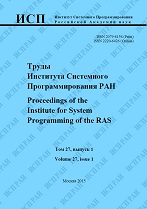|
This article is cited in 3 scientific papers (total in 3 papers)
Context-based model for concern markup of a source code
M. S. Malevannyya, S. S. Mikhalkovichb
a Don State Technical University
b Southern Federal University
Abstract:
In this paper we describe our approach to representing concerns in an interface of an IDE to make navigation across crosscutting concerns faster and easier. Concerns are represented as a tree of an arbitrary structure, each node of the tree can be bound to a fragment of code. It allows one to quickly locate fragments in the source code and makes switching between software development tasks easier. We describe a model which specifies data structures used to store the information about these code fragments and algorithms used to find the code fragment in original or modified source code. The model describes the information about code fragments as a set of contexts. Another important feature of the model is language independency. The model supports different programming, mark-up, DSL-languages and any structured text, such as a documentation. Main goal is to keep concern tree consistent with evolving source code. Search algorithm is designed to work with a modified source code, where the code fragment may change. The model is implemented as a tool, which supports different programming languages and integrates into different editors and integrated development environments. Source code analysis is performed by a set of lightweight parsers. In case of significant changes if the code fragment may be not found automatically the tool helps a programmer to find one by suggesting possible places in the source code based on the stored information.
Keywords:
Concerns, Separation of Concerns, Program Comprehension, Integrated Development Environments.
Citation:
M. S. Malevannyy, S. S. Mikhalkovich, “Context-based model for concern markup of a source code”, Proceedings of ISP RAS, 28:2 (2016), 63–78
Linking options:
https://www.mathnet.ru/eng/tisp20 https://www.mathnet.ru/eng/tisp/v28/i2/p63
|

| Statistics & downloads: |
| Abstract page: | 143 | | Full-text PDF : | 192 | | References: | 39 |
|




 Contact us:
Contact us: Terms of Use
Terms of Use
 Registration to the website
Registration to the website Logotypes
Logotypes








 Citation in format
Citation in format 
